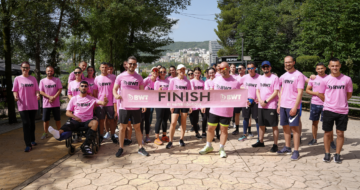UGent and AquaFlanders launch academic chair for sustainable drinking water

Ghent University and AquaFlanders, the sector federation of Flemish water and sewage companies, launched the academic chair for sustainable drinking water. The aim is to join forces in order to conduct research into how the sustainability and quality of our drinking water can be guaranteed into the future.
Ghent University and AquaFlanders, the sector federation of Flemish water and sewage companies, launched the academic chair for sustainable drinking water. The aim is to join forces in order to conduct research into how the sustainability and quality of our drinking water can be guaranteed into the future.
Ghent University and AquaFlanders, the sector federation of Flemish water and sewage companies, launched the academic chair for sustainable drinking water. The aim is to join forces in order to conduct research into how the sustainability and quality of our drinking water can be guaranteed into the future.
Climate change and the resulting periods of drought and intense rainfall are putting pressure on the water supply in Flanders. In order to increase the knowledge about drinking water and to motivate citizens to use more tap water as drinking water, UGent and AquaFlanders founded the chair for sustainable drinking water.
In the first place, the aim is to improve the knowledge of tap water, both in terms of quality, odor and taste, and to conduct research to further reduce the use of chemicals, such as chlorine. In addition, the microbial composition and biostability of the water will also be examined closely, as will the use of materials. However, the intention is to eventually open up the collaboration to address other issues such as climate change and the resulting periods of drought.
The supervisor of the chair will be Nico Boon, professor of Bioengineering. He will be assisted by co-supervisors Professor Elena Torfs (mathematical modeling) and Prof. Dr. Bart De Gusseme (water technologist). The collaboration between UGent and AquaFlanders runs initially until 2025.
Latest insights & stories

ROAD SAFETY
Since 2018, the number of traffic casualties in Flanders has risen again. Currently, the figures are stagnating, but the risk of accidents with injuries remains high for vulnerable road users in Flanders. And that while traffic should be safe for all users and modes. We want to change this by focusing on transparent policy, training on safe behavior, infrastructure improvements, legislation and enforcement.

What is needed for a more circular construction sector? Insights from Sien Cornillie, Circularity expert at NAV
NAV, or "Netwerk Architecten Vlaanderen," is a professional organisation for architects in Flanders. It offers various services including professional development and advocacy for the architectural sector. NAV also fosters networking opportunities and provides advice on legal, technical, and management aspects. The network is currently working on a position paper on circularity. We sat down with Sien Cornillie, an expert on circularity and energy at NAV. This interview reflects her own opinion.

A Global Movement: The World Unites in a Pink Pledge for Clean and Sustainable Water
5,000 participants. 32 countries. €30,000 funds raised. And that's just the beginning.
Picture this: One step that sends ripples across the globe, transforming lives and creating waves of change. You might wonder, how can such a simple action for most of us have such a profound impact?